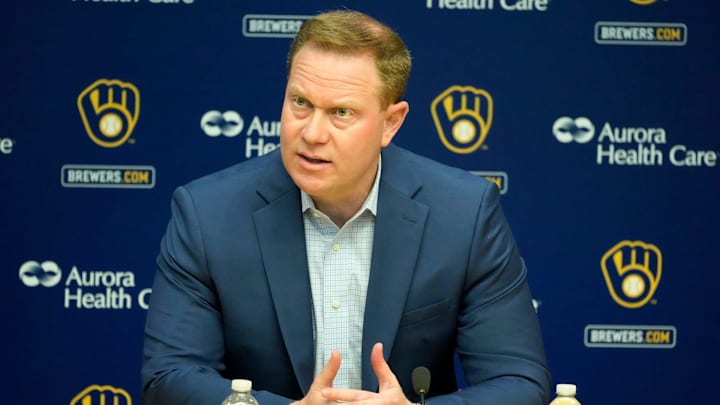With MLB's offseason nearing, the Milwaukee Brewers focus isn't yet on blockbuster trades. Recently promoted President of Baseball Operations Matt Arnold made that clear in his year-end press conference, stating that “trading Freddy Peralta is not on the front of my mind.”
While major shakeups across the league are bound to occur eventually this winter, Arnold's attention likely lies on more of the typical decisions that need to be made shortly after the World Series ends, such as contract options being exercised or declined and qualifying offers decided.
Of those early offseason tasks, the decisions on most contract options appear straightforward. Exercising Freddy Peralta’s $8 million club option is an easy call, while declining the options for Rhys Hoskins ($18 million), Danny Jansen ($12 million), and José Quintana ($15 million) seems just as clear.
William Contreras’s $12 million option might warrant some discussion, but even if it’s declined, he remains under team control and is projected to earn less through arbitration, making that route more practical.
Brandon Woodruff’s $20 million option initially appears likely to be declined, but considering the $10 million buyout, Milwaukee might choose to pay the difference and keep him for another season. Still, Woodruff’s representatives would be wise to turn down their side of the option and explore what additional compensation he could earn, either from the Brewers or another team. That makes the decision of whether to extend him a qualifying offer one that’s likely at the top of Arnold’s mind.
Should the Milwaukee Brewers extend a qualifying offer to Brandon Woodruff?
As hinted at earlier, mutual options are seldom exercised by both parties, so it’s highly likely that Milwaukee will end up paying Woodruff his $10 million buyout, making him a free agent. If the Brewers then choose to extend him a qualifying offer, it would add another $22.025 million for one season, meaning, if Woodruff accepts, his guaranteed earnings from the team this offseason would be $32.025 million.
The goal of extending a qualifying offer to Woodruff isn’t to add to the Brewers’ payroll, but to secure draft pick compensation if he chooses to sign elsewhere. Should Woodruff decline the offer and sign a contract worth at least $50 million with another team, Milwaukee would receive a compensatory pick between the first round and Competitive Balance Round A. If his new deal falls below $50 million, the compensation pick would instead come after Competitive Balance Round B.
With how much starting pitchers got paid last off-season, it is not unreasonable to think that Woodruff could sign a multi-year deal elsewhere and surpass $50 million. All it would take is a three-year deal with a $16.67 average annual value to get this done and secure an additional pick that is likely to land in the early 30s.
The way Milwaukee carefully eased Woodruff back into action last season following major shoulder surgery, and how he successfully adjusted to a dip in velocity, could make him especially appealing to other teams. Knowing the Brewers didn’t overwork him, combined with his prior track record of success, could help Woodruff secure a life-changing contract in free agency. While Milwaukee is unlikely to match that kind of offer, extending him a qualifying offer remains a realistic possibility and one that Arnold will have to decide on in the near future.
